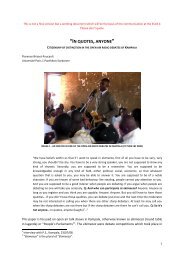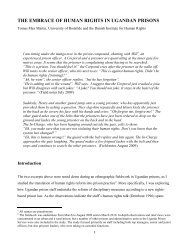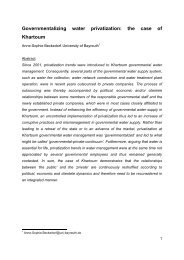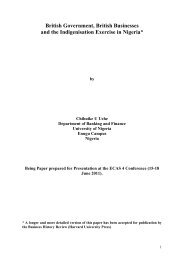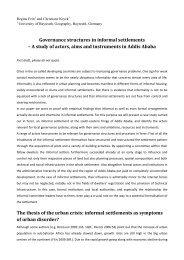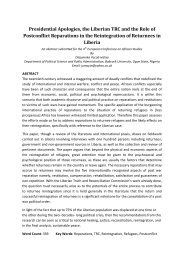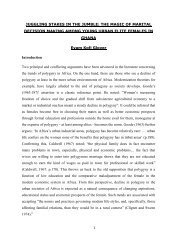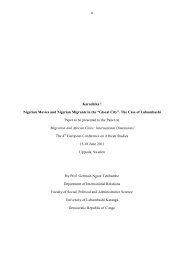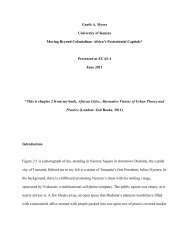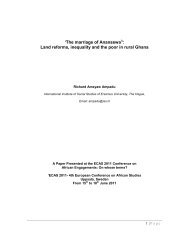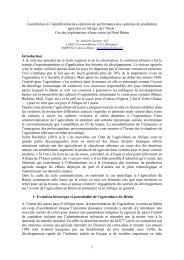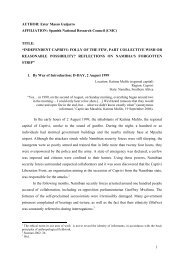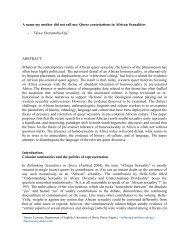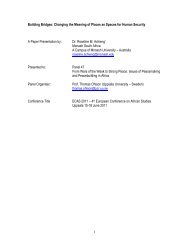Eyene Okpanachi, Peter C. Obutte, Ali Garba - Full Paper.pdf
Eyene Okpanachi, Peter C. Obutte, Ali Garba - Full Paper.pdf
Eyene Okpanachi, Peter C. Obutte, Ali Garba - Full Paper.pdf
You also want an ePaper? Increase the reach of your titles
YUMPU automatically turns print PDFs into web optimized ePapers that Google loves.
Can Institutional Reforms Liberate Africa from the Globalization Ghetto?<br />
Lessons from Economic Reforms in Nigeria's Fourth Republic<br />
<strong>Eyene</strong> <strong>Okpanachi</strong><br />
University of Alberta, Department of Political Science, Edmonton, Canada<br />
eyene.okpanachi@ualberta.ca<br />
&<br />
<strong>Peter</strong> C. <strong>Obutte</strong><br />
University of Ibadan, Faculty of Law, Ibadan, Nigeria<br />
pcobutte@gmail.com<br />
<strong>Paper</strong> presented at<br />
The 4 th European Conference on African Studies (ECAS 4) on the theme: „African Engagements:<br />
On whose terms?‟ at Ekonomikum - Centre for research and education in economics and social<br />
sciences, Uppsala University, 15-18 June, 2011.<br />
There is no doubt that one of the major ways of consolidating our democracy in<br />
this country is by putting in place credible institutions, which can continue to<br />
1
carry on the business of governance after we have left. Institutions are<br />
important because they operate in perpetuity. Governments come and go,<br />
individual office holders often change, but institutions remain.<br />
- President Obasanjo speaking at the official presentation of a book The Law of the<br />
Federal Republic of Nigeria at the National Assembly Complex in Abuja, May 2006.<br />
INTRODUCTION<br />
In recent years as part of development economics discourse renewed emphasis has emerged on<br />
institutional reforms and how these can help developing countries to benefit from globalization.<br />
This renewed emphasis is underlined by the new-institutional turn in academic literature which<br />
argues that institutions matter and that they structure incentives in human exchange, whether<br />
political or economic (North, 1990).<br />
Nigeria represented a country with dire need of reforms as at 1999 when civilian rule was<br />
established after years of ruinous military rule. As it has been noted by many, the characteristics<br />
of the Nigerian economy pre-1999 depicted a classic case of an economy in fundamental crisis.<br />
Specifically, during this period, public utilities and infrastructures were collapsing, inefficient<br />
and hence noted for poor service delivery.<br />
The transition from military rule to civilian rule in 1999 therefore brought renewed hopes that<br />
the elected government will usher in changes that will restructure the country‟s collapsing<br />
economy and enable it to play a dominant role in the global economy.<br />
Utilizing archival and documentary materials, this paper examines the economic reforms since<br />
Nigeria‟s return to democratic rule in 1999 till date and evaluates whether, and in what ways,<br />
these reforms have helped to liberate Nigeria from the margins of globalization. Specifically, the<br />
paper examines three key reforms - privatization, telecommunication liberalization and<br />
privatization including power sector reforms (electricity) and privatization - and their political,<br />
2
social, and economic outcomes. The paper argues that in spite of some progress made, economic<br />
reforms has been untidy and has not engendered the development dividends many Nigerians<br />
desperately yearn for in terms of improved quality of service and quality of institutions. In<br />
explaining this outcome, the paper highlights the problems posed for reforms by the material<br />
legacies, constraints, habits and cognitive frameworks inherited from the past; the opportunistic<br />
and self-interested attitude of political and economic elites; the weak democratic infrastructure<br />
and institutional framework for regulation, and the international context of globalization within<br />
which reforms are taken place<br />
The paper begins with an examination of privatization and examines outcomes using<br />
performance indicators of efficiency, transparency, and equity. The case of power sector<br />
privatization is used to elucidate the challenges of equity with regard to employment concerns.<br />
The next section follows with an examination of telecommunications liberalization sing the<br />
indicators of efficiency, consumer empowerment and transparency. A conclusion follows.<br />
PRIVATIZATION<br />
Privatization is one of the major planks of reforms since the return to democratic rule in 1999. In<br />
presenting the case for privatization President Obasanjo argued that „there are over-whelming<br />
facts and figures in support of the absolute necessity‟ to overcome the problems of state-owned<br />
enterprises and monopolies „through a well designed and single-minded pursuit of privatization<br />
programme‟ as it is being done in different parts of the world, especially in the developing<br />
countries (Obasanjo, 1999 cf. Bureau of Public Enterprises, 2001: 3). It was argued that over<br />
time, through direct massive investment and participation, Nigeria has developed a large public<br />
enterprise sector. Yet state owned enterprises have been poorly managed, plagued by political<br />
interference, poor financial performance and customer service. Nasir El-rufai, then Director-<br />
General of the Bureau of Public Enterprises (BPE), gave the following characteristics of<br />
government‟s investment in these public enterprises, their failed performances, and the need for<br />
privatization:<br />
There are about 590 public enterprises at the end of 2000 and 160 are involved in<br />
economic activities, generating goods and services. Over 5,000 board appointments are<br />
3
to staff these gigantic white elephants with enormous patronage bestowed on high<br />
official. About $100 billion has been spent by the Federal Government of Nigeria<br />
(FNG) to establish these public enterprises between 1973 and 1999 with a return rate of<br />
meager 0.5%, employing 420, 000 workers….These enterprises have become the<br />
hotbed for political patronage, corruption, parasitism and rent seeking for elite.<br />
Investment in Public Enterprises (PEs) in Nigeria were not just huge, but remained perhaps the<br />
largest in Africa (see Table 1), surpassing even Tanzania that practiced socialism with heavy<br />
state intervention in the economy.<br />
Table 1: Share of public enterprises (PEs) in the development indicators of selected African<br />
countries by 1997<br />
Country Number of PEs % of GDP % of<br />
investment*<br />
Nigeria 600 50% 57% 66%<br />
Côte d‟Ivoire 150 n/a 18% n/a<br />
Ghana 181 n/a 25% 55%<br />
Kenya 175 n/a 21% 9%<br />
Tanzania 420 13% 26% n/a<br />
Burkina Faso 44 5% 20% n/a<br />
Senegal 50 9% 33% n/a<br />
*= Formal sector only<br />
na – not available<br />
Source: Obadan & Ayodele (1998), cf. Jerome, 2008.<br />
4<br />
% of<br />
employment*<br />
Given the failure of PEs, Privatization was seen as the solution because it allows for the<br />
integration of the Nigerian economy „into the mainstream of world economic order‟ with<br />
accompanying inflows of technology, managerial competence, and capital „from the developed
world to enhance the performance‟ of these utilities (Obasanjo, 1999 cf. Bureau of Public<br />
Enterprises, 2001:5), but also because it:<br />
Permits governments to concentrate resources on their core functions and<br />
responsibilities, while enforcing the “rules of the game” so that the markets can<br />
work efficiently, with provision of adequate security and basic infrastructure, as<br />
well as ensuring access to key services like education, health and environmental<br />
protection (Obasanjo, 1999 cf. Bureau of Public Enterprises, 2001: 4).<br />
Historically, privatization was part of the broader Structural Adjustment Programme (SAP)<br />
developed by the IMF and implemented by the Ibrahim Babangida military. While SAP<br />
represented the desire of the Babangida regime to address the peculiar socio-economic and<br />
political conditions in Nigeria, especially the fiscal and monetary crisis faced by the regime, it<br />
should also not be forgotten that it reinforced the neoliberal development strategy developed by<br />
major institutions of global economic governance such as the IMF and the World Bank to<br />
achieve their vision of „global market civilization‟ which relegates government to‟ little more<br />
than transmission belt for global capitalism‟ (McGrew, 2002:349). Even though it has its own<br />
peculiar regime dynamics, the privatization programme that was started by the Obasanjo<br />
administration in 1999 was therefore a continuation of the exercise it inherited from the previous<br />
military regimes, with all its neoliberal underpinnings.<br />
The legal framework for the privatization programme during the first wave of the exercise<br />
spanning 1988–1993 was the Privatization and Commercialization Decree No. 25 of 1988. The<br />
Decree established the Technical Committee on Privatization and Commercialization (TCPC) to<br />
manage privatization process and listed a total of 110 enterprises that were to be privatized<br />
(either partially or wholly) with another 35 to be either partially or wholly commercialized<br />
(Zayyad, 1996). As of mid-1992, the TCPC completed privatization work on 62 out of the 73<br />
enterprises slated for full privatization, 22 out of the 25 enterprises slated for partial<br />
privatization, and commercialized through performance agreement 22 public enterprises. In<br />
addition, the exercise generated over N1.6 billion as privatization revenue (for the Government)<br />
and created over 600,000 (Zayyad, 1996).<br />
5
With the return to democratic rule, government adopted the Privatization and Commercialization<br />
Decree No. 28 of 1999 promulgated by the immediate past military regime of General<br />
Abdulsalami Abubakar. Consequently known as the Public Enterprises (Privatization and<br />
Commercialization) Act 1999, the legislation affirms government faith in further privatization<br />
and commercialization of Federal Government enterprises (wholly and partially owned) as well<br />
as the critical role of the private sector as the engine of economic growth. The legislation also<br />
empowered the BPE which had replaced the TCPC in 1993, to act as „the key driver of<br />
Government economic reform program‟ through „promoting a competitive economy and<br />
enfranchising Nigerians‟ (BPE, 2006: 2). The National Council on Privatization (NCP)<br />
supervises the BPE and approve policies on privatization and commercialization. The NCP is<br />
headed by the Vice President. The Director General of the BPE is also the member-secretary to<br />
the NCP.<br />
The Privatization Act also spelt out the specific mode, structures and timetable of privatization of<br />
Nigerian public enterprise. In all, the FGN set the goal of divesting about 94 PEs through<br />
privatization or commercialization as follows: 36 enterprises in which equity is held by<br />
government shall be partially privatized with Strategic Investor, federal government, and<br />
Nigerian individuals holding a Maximum of 40%, 40%, and 20% participation after privation;<br />
25 enterprises in which equity held shall be fully privatized; 24 enterprises were earmarked for<br />
partial commercialization, while 9 agencies and corporations enterprises for earmarked full<br />
commercialization (Bureau of Public Enterprises, 2001). However, because the Privatization Act<br />
empowers the NCP to alter the provisions in the document in the best interest of the country, the<br />
BPE has increased the list of the original 61 enterprises to be privatized (36 partial and 25 full<br />
privatization) by 37 extra enterprises, some of which were originally meant for<br />
commercialization (Anya, undated).<br />
Impact of Privatization<br />
Generally, the privatization exercise has been heavily criticized in Nigeria. Onjefu Adoga<br />
catalogues these criticisms as including:<br />
6
inchoate or lopsided asset acquisition and share purchase agreements, non<br />
enforceable clauses and breach of share purchase agreements, due diligence of large<br />
corporation conducted at the data room of the BPE instead of a full audit, under<br />
valuation of state assets such as the 1004 housing estates in Lagos, asset stripping by<br />
the private sector firm acquiring the state firm, trade and competition interest<br />
between the acquired Government enterprise and the acquiring firm operating and<br />
competing in the same market, lack of capacity of the acquiring private firm, lack of<br />
technical knowledge of the particular industry by the acquiring firm, inability to<br />
meet financial benchmarks, creation of a new monopoly, unnecessary retrenchments<br />
of public officers by the acquiring firm, incongruous or fraudulent assignment of the<br />
properties of state agencies to subsidiaries or vice versa as in the case of NITEL,<br />
favouritism in the selection of core investors, creation of lightweight sector<br />
regulatory commissions compared to State Agencies under its supervision (Adoga,<br />
2008).<br />
How true are these criticisms? We shall examine the impact of privatization reforms<br />
using the following performance indicators of efficiency, transparency, and equity.<br />
1. Privatization and efficiency<br />
The primary argument for privatization and commercialization is that the privatization leads to<br />
higher level of efficiency and profitability. Studies have revealed that „in most of the cases<br />
privatization led to improvement in efficiency, but at least in 25 per cent of the cases it did not‟<br />
(Hakro and Akram, 2009: 70). What is the Nigerian score card on the efficiency indicator?<br />
Between 1999 and 2007, the BPE privatized 147 PEs and realized N552 billion from the<br />
transactions. A breakdown of this figures shows that N14.655 billion was earned in 2000 from 6<br />
transactions, N12.147 was realized from 11 transactions in 2001, 13 transactions concluded and<br />
2002 yielded N13.284 billion. N301 million, N50.749 billion and N98.084 billion were<br />
generated for government from the transactions in 2003, 2004 and 2005, respectively. While<br />
N134billion was earned from 39 transactions in 2006, the highest privatization proceeds of<br />
7
N228.26 billion was realized from the 24 transactions concluded by the agency during the five<br />
months of 2007 (Economic Confidential, January 2008).<br />
Table 2: Proceeds of Privatization of Enterprises from 1999 To 2007<br />
S/N Year Number of Transactions Gross Proceed (N)<br />
1 2000 6 14,655,117,000.00<br />
2 2001 11 12,146,528,000.00<br />
3 2002 13 13,283,809,000.00<br />
4 2003 2 301,000,000.00<br />
5 2004 7 50,749,806,000.00<br />
6 2005 45 98,084,185,000.00<br />
7 2006 39 134,739,735,279.23<br />
8 Jan-May 2007 24 228,260,017,846.90<br />
Total 147 552,220,198,126.13<br />
Source: Bureau of Public Enterprises (Bureau of Public Enterprises, cf. Economic Confidential,<br />
January 2008).<br />
While these PEs have been privatized or commercialized and some revenues have been<br />
generated by government, a major dilemma of the privatization programme in Nigeria is that it<br />
has not yet achieved the objective of efficiency. Campbell (2006) has drawn attention to this<br />
development, arguing that a cursory look at most of the privatized companies reveals that they<br />
have not performed better than before (Campbell, 2006). After several denials, the BPE seems to<br />
have admitted its failure when it stated in 2009 that only 10 out of the privatized PEs in Nigeria<br />
are properly functioning as at today (Olaoye, 2010). This problem of non-performance was<br />
recently brought to the fore again by Namadi Sambo, the Vice President and Chairman of the<br />
National Council on Privatization (NCP), who stated that 80 percent of government companies<br />
that have been privatized have failed to operate properly due to lapses in the privatization<br />
process (Adaramola, 2011). The abysmal performance of privatized enterprises was also<br />
confirmed by president, Goodluck Jonathan, when the presidential spokesman stated that “apart<br />
from one or two, may be the Eleme Petrochemicals, others have not done very well, and the<br />
question is why? …what guided the investment decisions about these companies? It would<br />
appear like I said, that there were considerations other than competence and capacity in the final<br />
investment decisions that were taken” (Adaramola, 2011). These sad verdict on the privatization<br />
8
exercise confirms earlier conclusion by the House of Representative Committee on Privatization<br />
and Commercialization‟s nationwide tour of „all the privatized companies in different geo-<br />
political zones‟ which revealed, according to Abbas Braimoh, the Deputy Chairman of the<br />
Committee, „that most of the companies we visited are not doing well‟ (Hallah & Hassan, 2009).<br />
The case of Ajaokuta Steel Company Limited (ASCL) is particularly pathetic. While the steel<br />
complex which was built for over $6 or $7 billion by the Federal Government of Nigeria (FGN)<br />
in 1979 to fast track the nation's industrialization using steel as a solid base was concessioned to<br />
the Indian-based Global Infrastructure Holding Limited (GHIL), a subsidiary of the Ispat Group,<br />
owned by the Mittal steel-making family to manage at what some critics called an under-priced<br />
amount of $525 million (Ufot, 2008). Instead of increasing inefficiency, the company has been<br />
dormant since it was consessioned. It owes staff of the company several months of salary arrears<br />
while pensioners are yet to be paid 22 months pension arrears of about N2 billion owed them<br />
(Babajide, 2011). Given the litany of problem faced by the company, the then President Umaru<br />
Yar‟Adua in 2008 set up an administrative panel of inquiry to review the concession agreements<br />
and determine extent of compliance by both parties. The report of the panel revealed among<br />
others that „instead of investing external funds on the completion of the steel projects as<br />
expected, GHIL had embarked on massive borrowing from local commercial banks and used the<br />
assets of Delta Steel Company, another company concessioned to it to manage, as collateral<br />
(Ufot, 2008). GHIL was discovered to be indebted to Nigerian banks in the amount of US$192<br />
million while it could not pay the concessionaire the sum of N350 million outstanding as its<br />
statutory obligations in the concession agreements. Also, instead of investing in the company‟s<br />
infrastructure and human resource to develop it, the panel discovered that GIHL was engaging in<br />
stripping the assets of the company, cannibalizing the equipments and then exporting them. The<br />
panel also indicted GHIL for breaching the concession agreement which stipulated that he must<br />
submit a workable business plan within a specified time (Ufot, 2008). Consequent upon these<br />
findings, the FGN terminated the concession agreement with the GIHL in April, 2008 (Obaka,<br />
2010).<br />
This state of inefficiency replicated in almost all of the privatized firms questions the maxim<br />
anchored on the „Washington Consensus‟ that the „business of business is business‟ and the‟<br />
business of government is governing‟ as well as the privatization thesis which suggested that the<br />
9
dominant role of the state in the economy should be reduced and entrust much more to the<br />
private sector or market institutions considered to be more efficient and better managers of the<br />
economy (World Bank, 1981, 1984). The situation also refutes the major argument of the<br />
property rights school that „Private ownership concentrates rights and rewards; public ownership<br />
dilutes them‟ (Starr, 1988). Indeed as argued by Sam Amadi the divide between management and<br />
ownership in private enterprises may not necessarily support the theory that private ownership<br />
concentrates rewards while public ownership dilutes them (Amadi, 2003). Examples of private<br />
companies either mismanaged or not providing efficient services abound all over the world and<br />
this trend reflecting in huge corporate bankruptcies in the USA was a catalyst to the 2008-2009<br />
financial crisis that engulfed different countries in the world. The failed privatization in some<br />
transition economies and the disappointing results of infrastructure privatization in developing<br />
countries (Tan, 2011) are also good evidences of misplaced hope in privatization.<br />
While it is difficult to deny the dismal performance of the State in the management of public<br />
enterprises in Nigeria, the fact that privatized public firms are also not faring better is a pointer to<br />
the fact that “It is not the size of the public sector or even the extent of its economic intervention<br />
that are at fault. It is the economically destructive yet individually and politically rational<br />
calculations that shape the decisions of politicians and administrators‟ (Sandbrook, 198: 330). It<br />
is also a reminder that to be successful, the case for privatization of public enterprises needs to be<br />
made on a pragmatic enterprise-by-enterprise basis, rather than as an ideological exercise. In this<br />
perspective, viable public enterprises would be allowed to operate in a competitive environment<br />
side by side with private companies, but with no preferential treatment for the former (Ojelabi,<br />
2006).<br />
2. Privatization and transparency<br />
A key issue that affects the outcome of the privatization exercise is transparency. Transparency,<br />
according to the Word Bank, (cited in Igbuzo, 2003) involves adopting competitive bidding<br />
procedures, developing and abiding by objective criteria for selecting bids, and creating a clear<br />
focal point to monitor or regulate the whole programme. While the privatization Act commits the<br />
BPE to publishing annual reports and the BPE also reaffirms its own commitment to abide by the<br />
10
highest standards and make information with regards to post-privatization public „via internet<br />
and mass media, so that there is no misinformation in the public that gives rise to conspiracy<br />
theories‟ (BPE, 2006: 40), this has not been so. A perusal of the organization‟s website reveals<br />
scanty information. And this information does not have any detail about past privatization<br />
activities of the organization.<br />
This limited public disclosure is also noticeable in the absence of a comprehensive assessment of<br />
the post-privatization performance of affected enterprises that is documented and made public<br />
(Igbuzor, 2003). Even when it claims that it has carried out these evaluations, it has not made the<br />
reports public (Abubakar, 2010).The BPE is yet to make public the report of the post-<br />
privatization evaluation exercise it conducted recently. This problem has led to failure of the<br />
BPE to carry out an effective monitoring and evaluation of the privatization and<br />
commercialization programme in the country (Igbuzor, 2003).<br />
Serious questions have also been raised about the non-transparent processes of the pre-<br />
privatization responsibilities of the BPE. As Momoh (2002: 34) noted, „the way many of the<br />
enterprises are sold off leaves much to be desired. There is the issue of lack of proper valuing,<br />
incompetent valuers, and fraudulent valuers.‟ A testimony to trend is the tortuous experience of<br />
the privatization of the Nigerian Telecommunications Limited (NITEL) and its mobile<br />
component M-TEL which has recorded 4 failed attempts to privatize it. The Nigerian Compass<br />
narrates NITEL‟s ordeal thus:<br />
The painful privatization journey of NITEL, started in 2000 when Investors<br />
International Limited (IIL) of London bought 51% stake in the telecoms company<br />
to become its core investor. ILL paid the non-refundable 10% deposit amounting<br />
to US$131.7 million, but could not pay the remaining balance even after the<br />
deadline for the payment was extended. The sale was aborted in 2002.<br />
Consequently, in 2003, Pentascope, a Spanish telecoms firm, was appointed to<br />
prepare NITEL for sale, but this again was aborted following allegations of<br />
incompetence made against Pentascope. The third attempt to sell the company<br />
was in 2005, when Orascom of Egypt put in a bid of US$256.53 million for 51%<br />
of the company but the bid was considered as far below the market value of<br />
11
NITEL. And in 2006, Transcorp of Nigeria offered to pay US$500 million for<br />
51% stake in NITEL as its core investor. However, in June 2009, the federal<br />
government cancelled the sale of 51% of NITEL to Transcorp following what the<br />
National Council on Privatization described as Transcorp's serious breach of the<br />
terms and conditions of the agreement in respect of both NITEL and M-TEL<br />
(Nigerian Compass, 2010).<br />
The most recent sale of NITEL was to New Generation Telecoms Consortium which emerged<br />
the preferred bidder with an offer price of $2.5 billion during the opening of financial bids for<br />
75% shares in NITEL/ MTEL, on February 16, 2010. However, „as soon as the deal was struck,<br />
the bidders that lost out protested against what they saw as the shoddiness of the entire process‟,<br />
and this was followed by a disclaimer from China Unicom of Hong Kong, a key members of the<br />
consortium, that it was not part of the deal (ThisDay, March 3, 2011). Besides these<br />
controversies, just like before, New Generation could not pay the required 30% of the $2.5<br />
billion bid price at the stipulated time, thus ending the privatization attempt once again (Nigerian<br />
Compass, 2010).<br />
The fact that NITEL‟s selected core investors suddenly could not pay the sales fees after being<br />
certified as „technically and financially sound‟ (Andoga, 2008) or mismanaged it as did<br />
Pentascope raises serious questions with regard to whether the BPE sold NITEL to the deserving<br />
companies or whether companies with inadequate finance, technology and small asset turnover<br />
are concessioned to handle larger public agencies that are bigger than their capacities (Andoga,<br />
2008). Also the disclosure that President Obasanjo himself bought 200 million shares in Trans<br />
National Corporation of Nigeria Plc „TransCorp‟, (a corporation owned by his supporters who<br />
donated generously to his campaign fund and library project) which bought 51% stake in NITEL<br />
in 2006 in a very controversial had raised serious issue of transparency, created mistrust in the<br />
minds of the people and has buttressed the apprehension such as the one that the privatization<br />
programme is aimed at concentrating the nation‟s wealth in the hands of few individuals or that,<br />
as Pat Utomi puts it, “a few individuals who have access to power are taking away all the gains<br />
personally, directly,” (cf. The News, July 10, 2006).<br />
12
The intrigues and confusion associated with NITEL‟s privatization recently took a different<br />
dimension with the surreptitious sale of NITEL‟s building (NECOM House) by officials of<br />
Bureau of Public Enterprise all of who are now facing disciplinary investigations set up by BPE. 1<br />
3. Privatization and equity<br />
a. inter-group equity<br />
Privatization may tend to be a neutral activity and process, but the way it is implemented<br />
determines its outcomes and impact on various segments of society. It can result in a win-win<br />
situation or engender an oppressive system that denies basic economic and social rights (SERI,<br />
2003). Given this reality, reforms based on privatization are often fraught with difficulties<br />
because they deal with redistributive issues, and hence they may be seen in zero-sum terms by<br />
some groups and citizens. As McIntosh (2002) noted, „if we understand social policy to be about<br />
directives and actions that affect the well being of societal members by influencing the way<br />
goods and resources are distributed in society, then we need to acknowledge that by this process<br />
some groups and individuals will be advantaged and others disadvantaged.‟<br />
Privatization can thus distort the social-political terrain in some fundamental ways as it could<br />
lead to the concentration of national wealth in the hands of few “money bags”. To forestall the<br />
emergence of this situation, and to promote widespread ownership as well as ensure income-<br />
group equity in the shareholding in the privatization exercise, the privatization law included a<br />
ceiling on the amount of shares an individual could purchase. The federal Government also<br />
established the Privatization Share Purchase Loan Scheme (PSPLS) in 2003 with a capital base<br />
of N10 billion (later increased to N20 billion to enable indigent Nigerians above 18 years to<br />
borrow N10, 000.00 to purchase shares in the privatized companies at a maximum lending rate<br />
of 10.0 per cent. In addition, two management firms, Denham Management Limited and<br />
Thurbon Associates, were contracted by the BPE and paid the sum of 6.17 million and 900,000<br />
respectively to conduct the PSPLS (Shekarau, 2005).<br />
1 The skyscraper was reportedly sold to West African Aluminum Products Plc, a company owned by Chief Suarau<br />
Olayiwola Alani Bankole, the father of the Speaker of the House of Representatives, Mr Dimeji Bankole, for N4bn.<br />
See, The Sunday Punch (Nigeria), May 15, 2011, page 27.<br />
13
The good intentions notwithstanding, no tangible result was achieved on the PSPLC and no other<br />
alternative for mass participation designed in the privatization exercise. Hence the ordinary<br />
Nigerian continues to be excluded from participating in the privatization. The absence of real<br />
concern for equity in the privatization has lent credence to allegations made in many quarters<br />
that the privatization programme in reality is meant to advance the pecuniary cause of a few rich<br />
individuals in the society, especially those who are close to the president and that „privatization<br />
has created a new but greedy noveuax riche in Nigeria, at the expense of the people‟<br />
(Adejumobi, 2006):<br />
b. Privatization, equity and trade unions: the case of the privatization of electricity<br />
Another aspect of equity issues that determine the outcome of privatization is in relations to with<br />
employment, employee relations and interests. Nowhere has this issue raised its head more than<br />
in the power sector which presents compelling case for reforms but in which there seems to be<br />
no consensus between government and labor on how the reform should proceed. According to<br />
the BPE, as at 1999 when the democratically elected civilian administration started, the Nigerian<br />
electric power sector could only generate an average daily generation of 1,750 MW as only 19<br />
units of the 79 generation units in the country were operational due to corruption and<br />
inefficiency, and inadequate infrastructure. 2 Consequently, an estimated 90 million people were<br />
without access to grid electricity and the industry losses were estimated to be in excess of 50%<br />
(Onagoruwa, 2011).<br />
This situation informed government‟s reforms to transform the sector which were strengthen in<br />
March 2005 when the federal legislature enacted the Electric Power Sector Reform (ESPR) Act 3 .<br />
The Act outlined the framework of the reform as follows (Onagoruwa, 2011:7)<br />
• Unbundle the state owned power entity into generation, transmission and distribution<br />
• Provide for the transfer of assets, liabilities and staff of the Nigerian Electricity Power<br />
Authority (NEPA) to Public Holding Company of Nigeria (PHCN) and then to successor<br />
generation, transmission and distribution companies<br />
2 . No new electric power infrastructure had been commenced and completed between 1989-1999.<br />
3 . The ESPR Act 2005 provided the legal basis for the National Electric Power Policy (2001) which recommended<br />
among others the establishment of a sector regulator and the privatization of the electric power sector.<br />
14
• Create a competitive market for electricity services in Nigeria<br />
• Set up an independent regulator<br />
In lines with the provision of the ESPR Act 2005, NEPA was transformed into PHCN Plc as a<br />
transitional company to „hold‟ and manage the assets, liabilities, employees, rights and<br />
obligations of NEPA preparatory to its full privatization. The process of incorporation of PHCN<br />
was concluded on 5 th May 2005, and the initial transfer date of assets, liabilities and staff of<br />
NEPA to PHCN took place on 1 st July 2005. In November the PHCN was unbundled into 18 new<br />
successor companies comprising of 6 generation companies, 1 transmission company and 11<br />
distribution companies while in on 1 st July 2006, the assets, liabilities and staff of PHCN were<br />
transferred to the successor companies, thereby granting the latter greater operational autonomy<br />
(Onagoruwa, 2011).<br />
In its „Roadmap for power sector reform‟ launched on August 26, 2010, President Goodluck<br />
Jonathan affirmed government‟s commitment to the privatization of the 18 successor companies<br />
of the PHCN. Two committees earlier established by President Jonathan were tasked with<br />
implementing the Roadmap. These are the Presidential Action Committee on Power (PACP) and<br />
Presidential Taskforce on Power (PTFP). While the PACT has the „responsibility of providing<br />
leadership and guidance and to determine the general policy direction and strategic focus of<br />
power reform‟, the PTFP „is the engine room for the day to day planning, and it is charged with<br />
the responsibility of developing and driving forward the action plan of the Nigerian power<br />
sector, with achievable targets, especially with reference to the areas of Power generation,<br />
transmission, distribution, as well as fuel to power‟ (Jonathan, 2010). PACP is chaired by the<br />
President, and includes the Vice-President and Ministers of the Government while PTFP is<br />
chaired by the Special Adviser to the President on Power and includes members such as the<br />
Director-General of the BPE. Key objectives of the<br />
In implementing the Roadmap, government plans to review and increase electricity tariff in order<br />
to realize an „appropriate tariff regime‟ that would „give incentives to investors‟ (Jonathan,<br />
2010). Also, competitive tender has been carried out to receive bids from core investor groups<br />
for a minimum of 51% of equity of the successor thermal and hydro generating stations, and<br />
15
distribution companies. 331 local and foreign companies have so far submitted Expressions of<br />
Interest (EoIs) to the Bureau of Public Enterprises (BPE) in this regard. In addition, the 50,000<br />
workers of the PHCN would be disengaged from their jobs during the last phase of the<br />
privatization of the power sector and government has earmarked $900 million (N135 billion) for<br />
their severance benefits (Akinwumi, 2010).<br />
While the rationale for the privatization seems compelling given not just the present inadequacy 4<br />
of electricity which has crippled businesses and comfort in homes of Nigeria, but also given the<br />
fact that about $16 was reportedly invested into the power sector during the administration of<br />
president Obasanjo without much to show for it, the 50, 000 employees of PHCN, their<br />
professional union -the National Union of Electricity Employees (NUEE) and the Association of<br />
Electricity and Allied Companies (SSAEAC)- and the Nigerian Labor Congress (NLC)<br />
supported by some civil society groups have vehemently opposed government‟s planned<br />
privatization of the power sector. Led by the NUEE and the SSAEAC, these groups have raised<br />
concerns over the sale of a national asset such as PHCN to private companies, jobs loss and the<br />
impact of privatization on access to electricity for the ordinary Nigeria as a result of tariff<br />
increase which to them is aimed at „further strangulating the poor masses to pay more for their<br />
electricity which government has failed to provide‟ (Ogunmola, 2011). The electricity unions<br />
have also raised allegations of a deliberate undervaluing of the assets of the PHCN nationwide<br />
by government „with the sole aim of flinging them to the purported investors as has been done to<br />
other failed privatized companies like NITEL‟ (Ogunmola, 2011 ). They also cast doubt on the<br />
ability of government to cater for their welfare given the experience of workers in the other<br />
privatization exercises where arrears of workers‟ salaries and entitlements were not settled<br />
several years after their sale or attempted/unsuccessful sale. Given these issues raised, the<br />
electricity workers called for a gradual, steady and continuous processes” of involving „private<br />
sector in the sector, rather than selling off the existing power plants to purported investors to<br />
further exploit Nigerians‟, as well as the entrenchment of „labor democracy‟ aimed at „involving<br />
4 . According to the BPE, Nigeria‟s „current daily generation is about 3,200 mw, whereas it is estimated that about<br />
10,000 mw is required to ensure uninterrupted power supply.‟ See, „Frequently Asked Questions On Power Sector<br />
Reforms‟ http://www.bpeng.org/Electric_Power/Pages/FAQ.aspx<br />
16
workers and CSOs representatives in its management so as to enhance efficiency, transparency<br />
and confidence-building in the Company‟ (Ogunmola, 2011).<br />
TELECOMMUNICATION LIBERALIZATION<br />
Nigeria effectively commenced its telecommunication market reforms with the liberalization of<br />
the markets and the introduction of competition in mobile telephony with the licensing of 3<br />
Digital Mobile (GSM) operators in 2011 in order to address the „insufficient telecommunication<br />
facilities in Nigeria, which had been identified as one of the major contributing factors to poor<br />
state of the nation‟s economy‟ (Nigerian Telecommunications Commission, 2001: 1). This<br />
development was propelled by the conviction of President Obasanjo that Nigeria “cannot be<br />
talking about creating a conducive environment for foreign investments if the performance of our<br />
transport, telecommunications and energy sectors remains dismal and epileptic” (Obasanjo,<br />
1999, cf. Nudkwe, 2005: 21).<br />
In addition to the auction exercise in 2001 which produced NITEL, MTN Communications, and<br />
ECONET as winners of the licenses with the NCC earning a total of $855 million as license fees,<br />
the NCC also conducted another DML auction to select the second national operator (SNO) in<br />
2002. Globacom won the bid at the price of $200 million. In 2007, Etisalat Nigeria is the newest<br />
entrance into the Nigerian mobile market, operating in partnership with Mubadala Development<br />
Company and Etisalat of the United Arab Emirates became the fifth operator in Nigeria after<br />
acquiring the Unified Access License at a price of $400 million in January 2007.<br />
Also in March 2007, the NCC earned $600 million from the sale of 3G spectrum to four<br />
operating companies- Alheri Engineering Co. Limited, Celtel Nigeria Limited, Globacom<br />
Limited, and MTN Nigeria Communications Limited, and this sale made Nigeria „one of the first<br />
African countries to issue 3G spectrum‟ (Nigerian Telecommunications Commission 2007).<br />
This was followed up in July 2007 by another award of three carriers in the 800MHz spectrum<br />
17
and to Visafone Communications (U.S. Department of State, 2011). These auctions and<br />
licensing processes opened up the telecommunications with operators investing in infrastructure<br />
expansion.<br />
A key reform in the sector also was the passing into law of the Nigerian telecommunications Act<br />
(2003) whose objective is to provide „modern, universal, efficient, reliable, affordable and easily<br />
accessible communications services and the widest range thereof throughout Nigeria; encourage<br />
local and foreign investments in the Nigerian communications industry and the introduction of<br />
innovative services and practices in the industry in accordance with international best practices<br />
and trends‟ and „ ensure fair competition in all sectors of the Nigerian communications industry<br />
and also encourage participation of Nigerians in the ownership, control and management of<br />
communications companies and organizations‟ (Federal Republic of Nigeria, 2003: 6).<br />
To achieve the above objective, the Nigerian Communications Act (2003), amongst other things,<br />
repealed and replaced the NCC Act No 19 of 1992 which created the NCC, and strengthens the<br />
Nigerian Communications Commission (NCC) as an independent regulatory body for the<br />
communications sub-sector (Federal Government of Nigeria, 2003).<br />
Acting on its powers and „general responsibility for economic and technical regulation of the<br />
communications industry‟ (Federal Government of Nigeria, 2003: 9) the NCC created in July<br />
2007 the Consumer Code of Practice Regulation whose objective is to „confirm and clarify the<br />
procedures to be followed by Licensees in preparing approved consumer codes of practice in<br />
accordance with section 106 of the Act; and to determine and describe the required contents and<br />
features of any consumer code prepared by, or otherwise applicable to, licensees‟ (Nigerian<br />
Communications Commission, 2007: 6). The General Code contained in the Regulation were to<br />
serve as the „minimum set of requirements and standard for the provision of services‟ (Nigerian<br />
Communications Commission, 2007: 2) which the licenses operators are to adopt as their Code<br />
of Practice and then submitted to the Commission for review and approval (Nigerian<br />
Communications Commission, 2007: 2). The regulations in the code are designed to ensure the<br />
following (Nigerian Communications Commission, 2007: 6-23):<br />
18
- Provision of information to consumers - advertising and representation of services<br />
- Consumer billing, charging, collection and credit practices<br />
- Consumer obligations<br />
- Protection of consumer information<br />
- Complaints handling<br />
- Code compliance.<br />
What is the impact of the telecommunications liberalization? According to a study carried out for<br />
the IDRC by Balancing Act on „Consumer Best Practices in the Telecoms Sector‟, key issues to<br />
measure success in telecommunications regulations are Consumer access, Consumer choice,<br />
Consumer empowerment, Consumer protection from unfair practices, and Consumer redress<br />
(Gross and Southwood, 2009: 3). Using this as guide, we shall use the following three indicators<br />
that encompass the above issues to examine outcomes of telecommunications liberalization in<br />
Nigeria. These are: efficiency, consumer empowerment, and transparency.<br />
1. Telecommunication liberalization and Efficiency<br />
Telecom market reforms have transformed Nigeria‟s telecommunications market from one of the<br />
least developed to the biggest mobile market, and the most competitive fixed line market in<br />
Africa (Mobile Monday, 2011). Liberalization has led to universal access, defined by the<br />
International Telecommunication Union (ITU, 2003) as „widespread availability of telecoms or<br />
ICT service‟ (International Telecoms Union, 2003: 1).<br />
.<br />
Prior to liberalization, the telecommunication sector was monopolized by the Nigerian<br />
telecommunications limited (NITEL) and a handful of private telecommunications operators. By<br />
2001 there were a total of 866, 782 connected lines (out of which 266, 461 and 600, 321 were<br />
GSM and fixed lines respectively), with about 400,000 active GSM (Nigerian Communications<br />
Commission, 2011) and a teledencity hovering around 0.43 (Ndukwe, 2005) 5 With the<br />
liberalization of the sector, the country as at April 2011 has a total of over 117 million connected<br />
lines, with a GSM component of well over 103 million connected and over 83 million active<br />
lines. Teledencity is 64.70 (Nigerian Communications Commission, 2011). Today, ownership of<br />
5 . Calculated based on connected subscribers<br />
19
mobile phones now cuts across the various social classes, a remarkable difference from the pre-<br />
liberalization period when David Mark, one of the country‟s Ministers of Communication (and<br />
now Senate President) was reported to have stated in reaction to the outcry against lack of access<br />
to telephones that telephones are not meant for the poor (Akinlotan, 2009).<br />
With liberalization and competitive markets, there has also been reduction in prices of SIM card<br />
from about N15,000 6 in 2001/2003 to about N100 as at 2011, reduction in peak/off-peak period<br />
tariff, increase in percentage contribution to GDP from 0.6 in 2001 to 3.6 in 2009 (Nigerian<br />
Telecommunications Commission, 2011), and increasing FDI in the sector from about $50<br />
million in 2000 to $18 billion by 2009 (Agugoesi, Akubueze and Ndubisi, 2011).<br />
Table 3: Telecom subscriber data (April 2011)<br />
operator Connected lines Active lines Installed capacity<br />
Mobile (GSM ) 103,347,158 83,643,903 134,356,690<br />
Mobile (CDMA) 11,793,523 5,985,163 17,232,725<br />
Fixed 2,162,479 957,719 9,351,108<br />
total 117,303,160 90,586,785 160,940,523<br />
Source: Nigerian Telecommunications Commission (2011).<br />
Table 4: Share of telecommunications services (December 2010)<br />
Type of service Share (%)<br />
GSM 92<br />
CDMA 7<br />
Fixed 1<br />
Source: Nigerian Telecommunications Commission (2011).<br />
Table 6: Share of market operators<br />
Company Market share (%)<br />
MTN 47.64<br />
Globacom 24.17<br />
6 . Rough industry price. The retail price at this initial stage was haphazard ranging from this stated N15, 000 to<br />
about N50, 000 in some cases.<br />
20
Airtel<br />
ECONET)<br />
(originally 19.50<br />
EMTS (e.i. Etisalat) 8.36<br />
M-TEL 0.32<br />
Source: Nigerian Telecommunications Commission (2011).<br />
The impact of this development are enormous: it has reduced the number of anxious potential<br />
subscribers awaiting connection, minimized transaction cost and widened market opportunities,<br />
improved customer choices and information flow, substituted for physical transportation, and<br />
provided jobs. Also, telecoms liberalization has become a key factor in the development and<br />
deployment of new technologies and innovations which has in turn provided the backbone for<br />
transformations in other industries and opening great opportunities such as e-banking, e-<br />
education, etc in the country. GSM telephony has also made possible the enlargement of the<br />
„political space‟ as information about the democratic processes are now more open potentially<br />
enabling increased transparency, interactivity and participation than before.<br />
However, in spite of the gains of liberalization and the numerous regulations designed by the<br />
NCC to ensure efficient service and customer‟s satisfaction backed up by the enormous powers<br />
of the NCC to impose fines, sanctions or penalties on any operator that contravenes its<br />
regulations, efficiency has not truly achieved. Consequently, the claim by Ernest Ndukwe, then<br />
executive vice chairman of the NCC, that the Nigerian telephone Consumer is the “King” and<br />
“the main object, the subject and the reason” for the existence of the Commission (Nigeria<br />
Communications Week, June 4, 2009) is yet to translate into reality.<br />
The consequence of this failure is gargantuan, impacting negatively on quality service and<br />
consumer satisfaction. As pointed out by the National Association of Telecommunications<br />
Subscribers (NATCOMS) despite the phenomenal growth recorded in the telecom sector and the<br />
attendant profit accruing to the operators, the quality of their service is less than satisfactory<br />
(Eni, 2006). Some of the complains of consumers in Nigeria includes, „false billing, arbitrary<br />
disconnection of service, poor service delivery, drop calls, non-chalant attitude towards genuine<br />
complaints, , deceptive advertisement, credit depletion, inability to recharge, inability to check<br />
credit balance, network failure, sending/charging for multiple text massages in place of a single<br />
one‟ (Nigeria Communications Week, September 8, 2008).<br />
21
According to the NCC, part of the reason for poor quality service reflected in “too much drop<br />
calls, poor network availability, poor service accessibility and poor voice quality” is the<br />
increasing network congestion arising from what the NCC describes as the operators‟ installation<br />
of substandard equipment and devices including the presence of „many weak and dead signal<br />
zones in major cities …which is attributable to lack of network optimization and improper radio<br />
network planning‟ (Adepetun, 2011a). The operators have also been accused of „commitment of<br />
an inadequate portion of their revenues to network expansion‟ and infrastructure (IT News<br />
Africa, May 20, 2009). However, according to the operators, they should not to be blamed for<br />
the poor service as the reasons for the problems are beyond their powers. For instance, they<br />
complain that multiple or excessive taxes by the three tiers of government and other problems<br />
such as vandalisation of telecom infrastructure has made it extremely difficult for them to expand<br />
services through deployment of the required base stations or offer effective services (Adepetun,<br />
2011a).<br />
While the blame game and shifting responsibilities continues, poor quality service has not only<br />
increased but has also led to increasing cost of telecommunications transactions on the<br />
consumers. A good evidence of this increasing cost is number of phones an individual consumer<br />
has to own and maintain in order to communication loss as a result of poor quality service.<br />
According to informal survey carried out by Odinma (2011) from 101 consumers, only 2 or less<br />
that 2% of the respondents have only one phone. By implication, more than 98% of the<br />
respondents use two or three phones connected to different service providers as a back-up to<br />
continue to communicate when there is bad quality service on any of the networks.<br />
22
Another area of inefficiency is the NCC‟s poor handling of SIM (Subscriber Identity Module)<br />
card registration. While the Nigerian Communications Act (2003) gives the NCC the powers to<br />
carry out activities such as SIM card registration empowers it to impose sanctions or fines on<br />
non-adherence to its regulations, the SIM card registration issue did not featured on the<br />
Commission‟s agenda in with the introduction of liberalization and subsequent years in spite of<br />
huge increase in the number of subscribers. It was not until recently when there were huge<br />
outcries about the use of SIM cards to perpetuate crimes such as terrorism, fraud, robbery, and<br />
kidnappings (given the ease with which SIM these cards are acquired with ownership<br />
information) 7 that the NCC directed service providers to start the process. However, compliance<br />
at this stage that the subscriber base has reached beyond 80 million has become difficult. SIM<br />
card registration has not only met with little enthusiasm from subscribers, there have also been<br />
logistic problems with regard to the registration. Hence at the end of the 8 month exercise, all the<br />
operators were only able to register just 11 million subscribers out of the active lines put at over<br />
80 million (Adepetun, 2011b). The NCC has gotten N6.1 billion from the government to carry<br />
out its own SIM card registration which would then be merged with that carried out by the<br />
operators. However indications have emerged that this exercise, just like the one carried out<br />
earlier by the providers, may not be successful as the exercise has been moving at a very slow<br />
pace due to poor turn-out by Nigerian subscribers (Egesi, 2011). This problem, akin to putting<br />
the cart before the horse, points to the challenge of carrying out reforms retroactively (when the<br />
industry has developed fully), in this case almost a decade after implementation began.<br />
2. Consumer empowerment<br />
The NCC has designed several initiatives in its bid to empower the consumer and entrench<br />
consumer satisfaction as a measure of performance for service providers. They include Telecom<br />
Consumer Parliament (TCP), Consumer Outreach Programme (COP), Consumer Town-Hall<br />
Meeting (CTM), Industry Consumer Advisory Forum, Empowering Consumer Advocacy<br />
Groups, ICTs for Persons with Special needs, and Integrated consumer contact center<br />
(Emakpore, 2009).<br />
7 . Given this inadequacy, it has been the police has not been able to apprehend perpetrators of crime as it was<br />
difficult to trace any particular phone number to any particular individual.<br />
23
Perhaps the most institutionalized and popular of these initiatives is the Telecom Consumer<br />
Parliament (TCP). The Commission Instituted the TCP in 2003 as an interactive and<br />
participatory monthly forum where telecoms service consumers, service providers, the regulator<br />
(the Commission) gather to discuss issues pertaining to consumer interests including rights,<br />
privileges and obligations, as well as their views about the problems they face with regard to<br />
quality of delivery (QoS) and consumer satisfaction (CS). The TCP is held once a month and the<br />
venue is rotated among the 6 geographical zones in the country. The maiden edition of this<br />
monthly event was held on August 29, 2003 while the 61st th session held in Lagos in March<br />
2011.<br />
The TCP has helped voiced out consumers concerns on some of the issues that lead to<br />
inefficiency and poor quality service (noted above) such as network congestion and drop calls,<br />
deceptive and predatory telecommunication promotions across networks meant to rip-off<br />
consumers and „enrich telecom operators and expand their subscriber number across networks‟<br />
(Balancing Act, 2010), interconnection, and the registration of SIM cards. The TCP has also<br />
discussed other issues germane to the growth of the industry such as environmental impact<br />
assessment.<br />
According to the Commission, the TCP offers the following advantages (Emakpore, 2009):<br />
▪ inexpensive complaints/dispute resolution<br />
▪ instant resolution of consumer complaints<br />
▪ addressing pertinent industry issues of consumer concern<br />
▪ disseminating information on consumer rights & obligations<br />
▪ eliciting clarifications from service providers on services offered<br />
▪ sharing industry information<br />
Its major impacts, also according to the NCC, includes (Emakpore, 2009):<br />
▪ Regulatory interventions & directions on:<br />
- Per Second billing<br />
- Increase in validity period<br />
- Toll Free on customer care & help lines<br />
- removal of validity window on recharge cards<br />
24
- improvements in complaints resolution by Service Providers<br />
- Guideline on premium rated service<br />
- Reduction in SMS tariff<br />
▪ First hand feedback from consumers on QoE<br />
▪ Instant complaints resolution<br />
▪ Consumers participation in decision making<br />
▪ Restore consumer confidence<br />
▪ Promote consumer advocacy<br />
. Consumer information & education<br />
▪ Institutionalize public accountability<br />
The TCP has also been praised as a model and a notable example of consumer best practices<br />
(Gross and Southwood, 2009), with countries such as Sierra Leone establishing its own annual<br />
„Consumer Parliament‟ based on the Nigerian model (Sesay, 2010). A remarkable aspect of the<br />
TCP is the fact that the „proceedings are widely attended with operators present to answer<br />
questions and respond to the debate‟ and also that these „proceedings are shown on television<br />
giving it a wider impact beyond those who attended‟ (Gross and Southwood, 2009:7).<br />
Yet, the NCC‟s goal of empowering the customer through the TCP or other initiatives is still<br />
questionable given the litany of complains that still exists by consumers that they are being<br />
exploited by the operators and the fact that the problem of efficient service delivery still persists<br />
as admitted by even the Commission. While there have been lowering of tariff and creation of<br />
lower denomination and affordable recharge cards, extension of validity period, tariffs are still<br />
high (Adaramola, 2011; Odinma, 2011). Also worrisome is the fact in spite of the problems, the<br />
NCC, as its Executive Vice-Chairman, Dr. Eugene Juwah admitted, has adopted a “soft<br />
approach towards enforcement and compliance” and sanctions whenever they are imposed “are<br />
not commensurate to the degree of breach” (Adekoya, Aginam, and Osuagwu, 2009).<br />
Consequently, there has been “a major lapse in the disposition of the service providers towards<br />
compliance to regulations or directions issued by the Commission” and this “tardy compliance<br />
with regulations instituted by the regulator” has led to “a lot of consumer issues prevalent in the<br />
industry today” (Ibid.). Yet it has been argued that regulatory conduct such as this implies<br />
indifference to stipulations under the National Communications Act, 2003 implies a refusal to<br />
25
uphold government declaration on economic development challenges (<strong>Obutte</strong>, 2008) in the<br />
country.<br />
Importantly also, it is difficult to evaluate the purported impact of the TCP as enumerated by the<br />
NCC. To be sure, pronouncements have been made by the NCC at the TCP calling on service<br />
providers to make changes for better service or compensation. A good example here was the<br />
NCC‟s order that three operators- Globacom, MTN and Celtel (formerly Econet and now Airtel)-<br />
should reimburse customers in the form of extra airtime credit of N175 (US$1.50) for poor<br />
service quality (and violation of the Commission‟s Key Performance Indicator (KPI)<br />
benchmarks), an order which the mobile operators challenged in court but which the court<br />
affirmed in 2008. However, it is not clear whether some of the impacts attributed to the TCP by<br />
the NCC are really attributable to it or other factors or dynamics. Take the issue of the<br />
introduction of per second billing (PSB) for instance. Consumers have persistently complained<br />
that the per minute billing (PMB) in existence rips them off as it meant „that they automatically<br />
had to pay for the whole of the next minute for calls that exceeded the previous minute even by a<br />
second‟ (Obadare, 2004). While a consumer protection group- the National Association of<br />
Telecommunications Subscribers (NATCOMS) of Nigeria – discussed the possibility of<br />
changing to the PSB with the existing service providers (MTN and Econet) with the inception of<br />
mobile telephony, there were no positive responses from them and the NCC did not effect this<br />
needed change by the consumers. It was not until the entrance of Globacom (the second national<br />
operator licensed in 2003) which introduced PSB as a market strategy to have an edge over the<br />
existing service providers upon its launching in August 22, 2003 (even before the maiden edition<br />
of the TCP held on August 29, 2003) that the others were forced to switch to PSB in quick<br />
succession in order not to lose customers with Econet, MTN, and M-TEL (an offshoot of the<br />
fixed-line national operator NITEL) introducing the PSB on November 26, 2003, December 1,<br />
2003, and December 9, 2003 respectively. Adeolu Ogunbanjo, the founding president of<br />
NATCOMS, narrated the story of the introduction of PSB thus:<br />
Econet wireless and MTN were the only GSM companies in Nigeria at the time,<br />
and we told them about the high tariff, but they said it was not possible to go on per<br />
second billing. When Globacom was about to roll out, we went to them for a<br />
meeting. We advised them to start with per seconds if they wanted to win the<br />
26
market. They heeded our advice. What Econet wireless and MTN said was not<br />
possible was made possible by Globacom. I remember that the Chief Marketing<br />
Officer of MTN then, Afam Edozi, told us that it cannot be possible (Afolabi,<br />
2010).<br />
Besides the entrance of Globacom, some of the gains and concessions can also therefore be<br />
attributable to protests and activism by civil society groups led by NATCOMS 8 which sued the<br />
service providers for poor services and organized a major boycott of mobile telephones on<br />
September 19, 2003 (the 9/19 GSM switch off). This event and other subsequent actions by the<br />
group were also instrumental to some of the changes that have taken place in the sector, and not<br />
solely as a result of the intervention of the NCC using the instrumentality of the TCP. In fact,<br />
many believed that NCC was part of the problems bedeviling the sector and that it was because<br />
they collude with the providers that they (providers) are not sanctioned in spite of their<br />
embarrassing services. This view is evidenced from the following outcry from a newspaper<br />
columnist:<br />
Thus it could be argued as Obadare (2004: 32) did that it „took the rap from civil<br />
society organizations and citizens who thought that it had failed to take firm action<br />
against the erring telephone companies‟ and this intervention was responsible for<br />
some of the gains witnessed in sector, including some of the games attributed to the<br />
TCP. Yet, while civil society activism is important in ensuring positive outcomes,<br />
the Nigerian case also demonstrates that „it is also apparent that no matter how<br />
determined, civil society, ranged against the immense powers that huge business<br />
concerns are capable of mustering, cannot create the desired changes in society<br />
alone. It requires a strong state that is resolutely committed to the rule of the law and<br />
social transparency‟ (ibid).<br />
3. Liberalization and Transparency<br />
8 . Other civil society organizations dedicated to activism against „the rip-off‟ of the Nigerian consumer during this<br />
period include Unofficial Consumer Protection Agency (UCPA), GSM Subscribers Association of Nigeria,<br />
Nationwide Action Against Corruption (NAAC), Telecommunications Subscribers Rights Agenda (TSRA),<br />
Concerned GSM Subscribers in Nigeria, Probity in Nigeria (PIN), and National Association of Mobile Phone<br />
Subscribers. Presently, a very active organization which has been contesting the actions and inactions of service<br />
providers is the Consumers Protection Council (CPC). However, the CPC is not a civil society group but an agency<br />
of the federal government created to „Providing speedy redress to consumers complaints through negotiation,<br />
mediation and conciliation.‟ For more on the CPC, see http://www.cpc.gov.ng<br />
27
What is the score card of the reforms based on transparency, fairness and non discrimination?<br />
The NCC has been praised for establishing a „clear policy and a flexible regulatory framework‟<br />
and for utilizing „a competitive and transparent process to offer GSM mobile licenses attracting<br />
big investments and increasing the level of competition‟ (International Chamber of Commerce,<br />
2007: 13). This view is supported by a study conducted in 2006 which found, in relation to the<br />
issue of promotion of competition amongst service providers, that „NCC is perceived to be doing<br />
a good job. 64.6% of individual consumers, 67.2% of corporate consumers and 61.7% of service<br />
agents rated NCC as highly effective, fairly effective or effective in this function. A large<br />
percentage of consumers listed the licensing of many service agents as the key determinant of<br />
their views‟ (Nigerian Telecommunications Commission, 2006). A key aspect of the NCC/s<br />
transparency is its culture of consistently publishing industry regulations and guidelines and<br />
consultation in decision processes and decision making. Chairman of Association of Licensed<br />
Telecom Operators of Nigeria (ALTON), Gbenga Adebayo, affirms this when he stated that “I<br />
believe that the NCC leadership consults very widely with the industry before any decision is<br />
made. We have all become used to this in the industry and it has contributed to the smoothened<br />
relationship between the regulator and industry operatives” (Agugoesi, Akubueze and Ndubisi,<br />
2011). The NCC‟s performance in regulatory governance has therefore enhanced investors‟<br />
confidence in the industry. As Wale Goodluck, the Corporate Services Executive at MTN, stated,<br />
“We have never witnessed arbitrary decisions on the part of the regulator which gives us some<br />
measure of predictability about the industry at all times” (Agugoesi, Akubueze and Ndubisi,<br />
2011).<br />
In spite of these positive evaluations however, the NCC has been criticized by some as colluding<br />
with the big service providers to send the small and new operators out of business, even though<br />
the NCC has refuted this claim and argued that the earlier licensees have been losing market<br />
share in ways that will prevent them from holding positions of market dominance either alone or<br />
collectively substantially and that it has „not found any conclusive evidence that any of the<br />
mobile licensees are engaging in conduct which has the purpose or effect of substantially<br />
lessening competition‟ (Nigerian Telecommunications Commission, 2010: ii).<br />
28
The service operators have also been accused of offering bribes in form of free-toll calls to<br />
members of the legislature to get favorable. There have also as well as allegations such as the<br />
one recently made by the President -General of the Senior staff Association of Communications,<br />
Transport and Corporations (SSACTAC) Comrade Adetunji Adesunkanmi, that “the board of<br />
director” of the GSM “companies are the same people in government. There are the shareholders<br />
that and have vested interest in the companies” (Ahiuma-Young, 2010). Also, while its earlier<br />
award of licenses were adjudged as largely transparent, the NCC recent award has been fraught<br />
with complaints by the losers over allegations of unfairness. The high point of this was license<br />
awarded for the 2.3GHz spectrum in May 2009, through what it (the NCC) described as a<br />
competitive bidding process, but which was later cancelled by then President Yar‟Adua licenses<br />
because they did not adequately comply with “the letters and spirit of the stipulated rules and<br />
guidelines” (Timothy, 2009).<br />
CONCLUSION<br />
The impact of institutional reform in Nigeria has been uneven. On one hand, telecommunications<br />
liberalization has ushered in increasing FDI, access and employment to Nigerians, and its<br />
implementation has been relatively transparent. Yet the sector is however still fraught with<br />
problems of poor quality delivery. By contrast, the privatization programme has recorded little<br />
or no significant gain in efficiency, has huge transparency problems, and issues of equity have<br />
not been settled.<br />
The paper demonstrates that while appropriately designed institutions are important and do<br />
structure reform, factors other than institutions mediated impact on reform outcome. Specifically,<br />
outcomes have been shaped and structured by the character of accumulation of the Nigerian<br />
state, the degree of its independence in the global economic system, political process and<br />
political economy, and social forces and it is the complex interactions of these issues with<br />
institutional design that determine success or failure as well as who wins, who loses and why in<br />
the reforms. Another important fact worth stressing is that institutions are not mere black boxes<br />
but espouses particular values. Consequently, preoccupation with institutional reform without<br />
adequate attention to the context in which reforms are taking place can conceal the values,<br />
29
interests and agenda that are being served and hence complicate the reform process and outcome.<br />
Indeed as Amadi (2004) has noted, ongoing reforms in Nigeria are not just only a functional<br />
response of the Nigerian state to the exigencies of economic renewal, but they are also taking<br />
place because the dominant world view of globalization promulgated by international regimes –<br />
World Bank, IMF, WTO - made such policies seem appropriate and fait accompli and others<br />
illegitimate in the eyes of national authorities even though the „discipline of global market forces<br />
effectively constrains the development strategies‟ (McGrew, 2002: 349) which the Nigerian state<br />
may pursue<br />
REFERENCES<br />
Abubakar, Jibrin. 2010. Privatised companies grounded. Daily Trust.<br />
http://dailytrust.dailytrust.com/index.php?option=com_content&view=article&id=8970:privatise<br />
d-companies-grounded&catid=1:news&Itemid=2<br />
Adaramola, Zakariyya. 2011. Subscribers complain of bad network, high tariff-Nigeria-<br />
Telecoms. Daily Trust. March 7. http://allafrica.com/stories/201103071008.html<br />
Adejumobi, S. 2006. “The Bogey of Reforms.” The Guardian, August 16, p. 65.<br />
Adekoya, Adekunle, Emeka Aginam, and Prince Osuagwu. 2011. The party is over, Juwah tells<br />
telecoms operators. Vanguard. January 26. http://www.vanguardngr.com/2011/01/the-party-isover-juwah-tells-telecoms-operators/<br />
Adepetun, Adeyemi. 2011a. Network congestion on the increase, says NCC. The Guardian. May<br />
25.<br />
http://www.guardiannewsngr.com/index.php?option=com_content&view=article&id=49068:net<br />
work-congestion-on-the-increase-says-ncc&catid=55:compulife&Itemid=391<br />
Adepetun, Adeyemi. 2011b. SIM registration: Consumers bemoan low awareness, human capital<br />
deployment. The Guardian. March 16.<br />
http://ngrguardiannews.com/index.php?option=com_content&view=article&id=41684:simregistration-consumers-bemoan-low-awareness-human-capitaldeployment&catid=55:compulife&Itemid=391<br />
30
Adoga, Onjefu. 2008. A Critical Appraisal of Privatization in Nigeria. Brooks Chambers.<br />
October 8. http://www.hg.org/article.asp?id=5491<br />
Afolabi, Bukola. 2010. How we influenced per second billing. National Life. July 3.<br />
http://www.thenationallifeonline.com/index.php?option=com_content&view=article&id=2322:h<br />
ow-we-influenced-per-second-billing-&catid=68:lifebiz&Itemid=514<br />
Ahiuma-Young, Victor. 2010. Workers fault N6bn SIM cards registration budget. December<br />
13. Vanguard. http://www.vanguardngr.com/2010/12/workers-fault-n6bn-sim-cardsregistration-budget/<br />
Akindele, Richard. Are GSM Users Getting Better Services? Daily Trust. August.<br />
http://www.nairaland.net/mobile/thread.php?topic_id=448<br />
Akinwumi, Rotimi. 2010. Fifty Thousand PHCN Staff to Be Sacked Next Year. Daily<br />
Independent. October 27. http://allafrica.com/stories/201010290573.html<br />
Akinlotan, Idowu. 2009. David Mark‟s graceless reply. The Nation. August 16.<br />
http://thenationonlineng.net/web2/articles/14312/1/David-Marks-graceless-reply-/Page1.html<br />
Amadi, S. 2003. “ Privatization without Reforming” A paper presented at Civil Society Policy<br />
Makers Public Forum organized by Socio economic Rights Initiative (SERI) at Airport Hotel,<br />
Lagos on Tuesday July 22<br />
Anya, O. undated. Privatization in Nigeria.<br />
http://www.nigerianlawguru.com/articles/commercial%20law/PRIVATISATION%20IN%20NI<br />
GERIA.doc.<br />
Babajide, Johnson. 2011. Pension arrears: Ajaokuta Steel Company pensioners appeal to FG.<br />
May 25. http://tribune.com.ng/index.php/news/22508-pension-arrears-ajaokuta-steel-companypensioners-appeal-to-fg<br />
Balancing Act. 2010. Nigeria‟s Telecom Consumer Parliament condemns telecom promos.<br />
Telecoms. Issue no. 497, March 26. http://www.balancingact-africa.com/news/en/issue-no-<br />
497/telecoms/nigeria-s-telecom-co/en<br />
Bureau of Public Enterprises. 2001. Privatisation Handbook. April. Abuja: BPE.<br />
http://www.fdi.net/documents/WorldBank/databases/plink/nigeria/nigeria_privatisation_handboo<br />
k.<strong>pdf</strong><br />
Bureau of Public Enterprises. 2006. Privatization Procedures Manual. March. Abuja: BPE.<br />
http://www.bpeng.org/bureau/Documents/Privatization%20Procedures%20Manual.<strong>pdf</strong><br />
31
Campbel, M. 2006. “Is Nigeria a Repressed Economy?.” Vanguard, September 14, p.18.<br />
Clifford Agugoesi, Ozioma Akubueze and Chimezie Ndubisi, 2010. Ndukwe: Recasting 10 yr<br />
strides of Africa‟s Iconic Telecom Regulator. Africa Telecom & IT magazine (AT&IT). March<br />
Edition. http://www.africatelecomit.com/marchedition2010/The%20BIG%20Issue.htm<br />
Nigeria Communications Week. 2008. Telecom Consumer Parliament (TCP) at 5. September 8.<br />
http://www.nigeriacommunicationsweek.com.ng/details.php?category=editorials&id=484<br />
Nigeria Communications Week. 2009. 50 Hearty Cheers to Telecom Consumer Parliament. June<br />
4. http://www.nigeriacommunicationsweek.com.ng/details.php?category=telecom&id=1292<br />
Economic Confidential. 2008. BPE Generates N552b in 8years ....Sheraton and SAHCOL to go<br />
in 2008. January. http://www.economicconfidential.com/jannationalbpe.htm<br />
Daily Independent. 2011. Power Sector Reform and Private Sector Investment. January 8.<br />
http://allafrica.com/stories/201101101348.html<br />
ThisDay. 2011. The Broken Nitel/Mtel Deal. March. 2.<br />
http://allafrica.com/stories/201103030960.html<br />
Nigerian Compass. 2011. Reversal of NITEL‟s privatization. March. 21.<br />
http://compassnewspaper.com/~compas/index.php?option=com_content&view=article&id=2761<br />
:reversal-of-nitels-privatisation&catid=58:editorial&Itemid=569<br />
Egesi, Chinwe. 2011. Subscribers Shun NCC‟s N6.1b SIM Registration . Leadership. April 19.<br />
http://www.leadershipeditors.com/ns/index.php?option=com_content&view=article&id=29303:s<br />
ubscribers-shun-nccs-n61b-sim-registration&catid=51:cover-stories&Itemid=142<br />
Emakpore, Lolia. 2009. Empowering the Consumer: Telecom Consumer Parliament<br />
A Nigerian Communications Commission Initiative. <strong>Paper</strong> at the 10 th Forum on<br />
Telecommunications/ICT Regulations and Partnership in Africa, Lusaka, Zambia. May 21.<br />
Emeka, Aginam and Elebeke, Emmanuel. 2010. Tough Options for Telecom Operators over<br />
Promos. Vanguard. March 23. http://allafrica.com/stories/201003240033.html<br />
Eni, Helen. 2006. Telecommunications: Give us Our Rights. TELL February 20. p. 48.<br />
32
Federal Republic of Nigeria. 2003. Nigerian Telecommunications Act, 2003.<br />
http://www.ncc.gov.ng/RegulatorFramework/Nigerian%20Communications%20Act,%202003.p<br />
df<br />
Gross, Isabelle and Southwood, Russell. 2009. Consumer Best Practices in the Telecoms Sector.<br />
http://www.idrc.ca/uploads/user-S/12760085651Consumer_Best_Practices.<strong>pdf</strong><br />
Hakro, Ahmed and Akram, Muhammad. 2009. Pre-Post Performance Assessment Of<br />
Privatization Process in Pakistan. International Review of Business Research <strong>Paper</strong>s. Vol.5, No,<br />
1. January. Pp. 70-86.<br />
Hallah, Tashikalmah &. Hassan, Turaki. 2009. Representatives to probe Obasanjo‟s privatization<br />
exercise. Daily Trust. September 24. http://allafrica.com/stories/200909240265.html<br />
International Chamber of Commerce. 2007. Telecoms liberalization: An international business<br />
guide for policymakers. http://www.iccwbo.org/uploadedFiles/TELECOMS%20LIBERedition%20Final.<strong>pdf</strong><br />
Igbuzor , O. 2003. “Privatization in Nigeria: Critical Issues of Concern to Civil Society.” A<br />
<strong>Paper</strong> Presented at A Power Mapping Roundtable Discussion on the Privatization Programme in<br />
Nigeria organized by Socio-Economic Rights Initiative (SERI) at Niger Links Hotel, Abuja on<br />
September 3 rd.<br />
International Telecoms Union. 2003.Trends in telecommunication reform 2003: promoting<br />
universal access to ICTs; Practical Tools for Communicators. http://www.itu.int/ITU-<br />
D/treg/publications/Trends03_ExecSummary.<strong>pdf</strong><br />
Jonathan, Goodluck. 2010. The Price of Darkness is Infinite. Text of a speech delivered during<br />
the Public Presentation of the Roadmap for the Nigerian Power Sector Reform. Lagos. Eko Hotel<br />
& Suites. August 26.<br />
IT News Africa. 2009. Nigerian telecom operators risk losing millions. May 20.<br />
http://www.itnewsafrica.com/2009/05/nigerian-telecom-operators-risk-losing-millions/<br />
Jerome, Afeikhena. 2008. Privatization and Enterprise Performance in Nigeria: Case Study of<br />
Some Privatized Enterprises. African Economic Research Consortium (AERC) Research <strong>Paper</strong><br />
175. February.<br />
McGrew, Anthony. 2002. Sustainable Globalization? The Global Politics of Development and<br />
Exclusion in the New World Order. In Allen, Tim and Thomas, Alan (eds.). Poverty and<br />
Development into the 21st Century. Oxford: Oxford University Press. pp. 345-352<br />
McIntosh, T. 2002. “Contested Realities: Race, Gender and Public Policy in Aotearoa/New<br />
Zealand.” UNRISD News. Number 25, Autumn/Winter. pp. 6-7<br />
33
Momoh, A. 2005. “Democracy or good governance? Making Sense of Disempowernment in<br />
Nigeria”. The Guardian, August 19. p. 51.<br />
Ndukwe, Ernest. 2005. Country Experirnce in Telecom Market Reforms – Nigeria. July.<br />
http://www.ncc.gov.ng/speeches_presentations/EVC%27s%20Presentation/Country%20Experie<br />
nce%20with%20Market%20Reforms%20in%20Telecoms%20%20-%20060705..<strong>pdf</strong><br />
Nigerian Communications Commission. 2001. Report on the Digital Mobile Licence Auction<br />
Exercise. March.<br />
http://www.ncc.gov.ng/speeches_presentations/evc's%20presentation/report_by_theevcon_dml.p<br />
df.<br />
Nigerian Communications Commission. 2006. Opinion Poll Rating of the Regulatory<br />
Transparency and Effectiveness of Nigerian Communications Commission. August.<br />
http://www.ncc.gov.ng/industrystatistics/Opinion%20Poll%20of%20NCC.<strong>pdf</strong><br />
Nigerian Communications Commission. 2007. Announcing the results of the licensing of<br />
spectrum in the 2GHz spectrum. March 19, 2007.<br />
http://www.ncc.gov.ng/3g_spectrum_licensing.htm<br />
Nigerian Communications Commission. 2010. Determination on Dominance in Selected<br />
Communications Markets in Nigeria. March 26.<br />
http://www.ncc.gov.ng/RegulatorFramework/Legal-NCC_Dominance_Determination.<strong>pdf</strong><br />
Nigerian Communications Commission. 2011. Telecommunications Industry Statistics at a<br />
Glance. http://www.ncc.gov.ng/index5_e.htm<br />
North, Douglas. 1990. Institutions, Institutional Change and Economic Performance.<br />
Cambridge: University Press.<br />
Obadare, Ebenezer. 2004. The Great GSM (cell phone) Boycott: Civil Society, Big Business and<br />
the State in Nigeria. Isandla Institute – Dark Roast Occasional <strong>Paper</strong> Series, No 18.<br />
Obaka, Abel. 2010. Ajaokuta steel workers owed six months salaries again. Daily Trust.<br />
February 21.<br />
http://sunday.dailytrust.com/index.php?option=com_content&view=article&id=2918:ajaokutasteel-workers-owed-six-months-salaries-again&catid=7:comment-a-debate&Itemid=113<br />
<strong>Obutte</strong>, P. C. 2008. Theory and Practice of Telecommunications Regulation in Nigeria through<br />
the Development Question. Germany: VDM-Verdlag.<br />
Odinma, Augustine. 2011. The problems of congestion in mobile networks in Nigeria. Vanguard.<br />
May 18. 18 May 2011 http://allafrica.com/stories/201105180715.html<br />
34
Ojelabi, S.A. 2006. “Privatization and Commercialization of Public Enterprises in Nigeria, Daily<br />
Champion, August 30, 2006. p 36-38.<br />
Onagoruwa, Bolanle. 2011. The Privatization of The Power Sector<br />
The Journey So Far. May 25. http://www.bpeng.org/pages/default.aspx<br />
Paul Starr. 1988. The Meaning of Privatization.<br />
http://www.princeton.edu/~starr/articles/articles80-89/Starr-MeaningPrivatization-88.htm<br />
Sandbrook, Richard. 1986. The State and Economic Stagnation in Tropical Africa. World<br />
Development. Volume 14, Issue 3, March. pp. 319-332.<br />
Sesay, Bai-Bai. 2010. Giving Telecom Consumers a Voice. Audience Scapes. July 14.<br />
http://www.audiencescapes.org/giving-telecom-consumers-voice-539<br />
Shekarau, Ahmed. 2005. Controversy Trails Privatization Loan Disbursement. Daily Trust.<br />
March 27. http://allafrica.com/stories/200503280697.html<br />
Tan, Jeff. Infrastructure Privatization: Oversold, Misunderstood and Inappropriate. Development<br />
Policy Review. Vol. 29, Issue 1, January. pp. 47–74.<br />
Timothy, Golu. 2009. Yar'Adua Revokes NCC's 2.3 Ghz Spectrum Licenses. Leadership. August<br />
11. http://allafrica.com/stories/200908120724.ht<br />
Uffot, Emmanuel. 2008. Ajaokuta Deal Cancelled. Newswatch. April 06.<br />
http://www.newswatchngr.com/editorial/allaccess/business/10406151320.htm<br />
U.S. Department of State (Bureau of Economic, Energy and Business Affairs). 2011. Investment<br />
Climate Statement- Nigeria. March. http://www.state.gov/e/eeb/rls/othr/ics/2011/157337.htm<br />
World Bank. 1981. Accelerated Development in Sub-Saharan Africa: An Agenda for Africa.<br />
Washington DC: World Bank.<br />
World Bank. 1984. Towards Sustained Development in Sub-Saharan Africa. Washington DC:<br />
World Bank.<br />
Zayyad, Hamza. 1996. Privatization and Commercialisation in Nigeria. in Privatization in<br />
Africa: The Way Forward, Olu Fadahunsi, Ed. Nairobi: AAPM.<br />
.<br />
35



